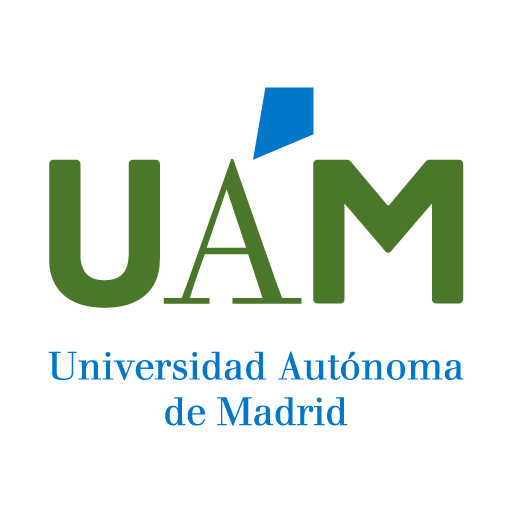Dr. Francisco Jurado




Doctor en Informática por la University of Castilla-La Mancha en 2010. Desde octubre de 2013 se encuentra adscrito al Departamento de Ingeniería Informática de la Universidad Autónoma de Madrid y desempeña su actividad investigadora en el seno del grupo de investigación GHIA.
Más información en: http://arantxa.ii.uam.es/~fjurado/
Last publications registered in ORCID :
A Human-Centred Profiling Approach to Characterise User Roles in Information Propagation on Online Social Networks, 2026, ACM Transactions on the Web. DOI: 10.1145/3787206
PBa-LLM: Privacy- and Bias-Aware NLP Using Named-Entity Recognition (NER), 2026. DOI: 10.1007/978-3-032-09368-4_1
RestRho: A JSON-Based Domain-Specific Language for Designing and Developing RESTful APIs to Validate RhoArchitecture, 2025, Future Internet. DOI: 10.3390/fi17080346
Fraud Detection in Cryptocurrency Networks—An Exploration Using Anomaly Detection and Heterogeneous Graph Transformers, 2025, Future Internet. DOI: 10.3390/fi17010044
Blending Language Models and Domain-Specific Languages in Computer Science Education. A Case Study on API RESTFul, 2025, International Journal of Interactive Multimedia and Artificial Intelligence. DOI: 10.9781/ijimai.2025.09.005
Understanding Information Propagation in Online Social Networks: A Systematic Mapping Study, 2025, IEEE Access. DOI: 10.1109/access.2025.3558768
The Influence of Knowing the Source of Information on Readers’ Perceptions. An Exploratory Study on Twitter, 2024. DOI: 10.1007/978-3-031-45645-9_4
An approach to build JSON-based Domain Specific Languages solutions for web applications, 2023, Journal of Computer Languages. DOI: 10.1016/j.cola.2023.101203
Understanding the Role of the User in Information Propagation on Online Social Networks: A Literature Review and Proposed User Model, 2023. DOI: 10.1007/978-3-031-48642-5_31
Teacher Assistance with Static Code Analysis in Programming Practicals and Project Assignments, 2021, International Symposium on Computers in Education (SIIE). DOI: 10.1109/siie53363.2021.9583635
The learning style of gamers: Exploring a multidimensional profile aimed at gamifying moocs, 2021, Research Anthology on Developments in Gamification and Game-Based Learning
Journalistic transparency using CRFs to identify the reporter of newspaper articles in Spanish, 2020, Applied Soft Computing. DOI: 10.1016/j.asoc.2020.106496
Tracking News Stories Using Blockchain to Guarantee their Traceability and Information Analysis, 2020, International Journal of Interactive Multimedia and Artificial Intelligence. DOI: 10.9781/ijimai.2020.06.003
A Content Analysis System That Supports Sentiment Analysis for Subjectivity and Polarity Detection in Online Courses, 2019, IEEE Revista Iberoamericana de Tecnologias del Aprendizaje. DOI: 10.1109/rita.2019.2952298
On the Identification of Several Key Issues on OER Discovery for Smart Learning Environments, 2019, Proceedings. DOI: 10.3390/proceedings2019031086
An Experience in Automatically Building Lexicons for Affective Computing in Multiple Target Languages, 2019, Computer Science and Information Systems. DOI: 10.2298/csis171001036j
Moods in MOOCs: Analyzing Emotions in the Content of Online Courses with edX-CAS, 2019, IEEE Global Engineering Education Conference. DOI: 10.1109/educon.2019.8725107
The Learning Style of Gamers, 2018, Emerging Trends, Techniques, and Tools for Massive Open Online Course (MOOC) Management. DOI: 10.4018/978-1-5225-5011-2.ch005
An Exploratory Analysis on MOOCs Retention and Certification in Two Courses of Different Knowledge Areas, 2018, IEEE Global Engineering Education Conference. DOI: 10.1109/educon.2018.8363434
An Exploratory Study in the Use of Gamer Profiles and Learning Styles to Build Educational Videogames, 2017, International Journal of Engineering Education
An approach to build XML-based domain specific languages solutions for client-side web applications, 2017, Computer Languages, Systems & Structures. DOI: 10.1016/j.cl.2017.04.002
PsiLight: a Lightweight Programming Language to Explore Multiple Program Execution and Data-binding in a Web-Client DSL Evaluation Engine, 2017, Journal of Universal Computer Science
The Rise of the (Modelling) Bots: Towards Assisted Modelling via Social Networks, 2017, IEEE/ACM International Conference on Automated Software Engineering. DOI: 10.1109/ase.2017.8115683
An Approach to Gamify an Adaptive Questionnaire Environment, 2016, IEEE Global Engineering Education Conference. DOI: 10.1109/educon.2016.7474696
Analyzing the Negative Effects of Motivating e-Learning Tools in Archeology Teaching, 2016, International Symposium on Computers in Education (SIIE). DOI: 10.1109/siie.2016.7751846
Bringing Egyptology to the Classroom: Virtual Reconstruction of the TT 209 Site, 2016, PROCEEDINGS OF 13TH INTERNATIONAL CONFERENCE ON REMOTE ENGINEERING AND VIRTUAL INSTRUMENTATION (REV). DOI: 10.1109/rev.2016.7444487
IMS-LTI and Web-Services for Integrating Moodle to an Eclipse-Based Distributed Environment for Learning to Program, 2016, International Journal of Engineering Education
Improvement Process of Adaptive Questionnaires: Implementation and Early Experiences With e-valUAM, 2016, IEEE Revista Iberoamericana de Tecnologías del Aprendizaje. DOI: 10.1109/rita.2016.2589638
Serious Games and Simulations in the eMadrid Network, 2016, International Symposium on Computers in Education (SIIE). DOI: 10.1109/siie.2016.7751872
eMadrid Project: Authoring, Reuse and Remote Labs, 2016, International Symposium on Computers in Education (SIIE). DOI: 10.1109/siie.2016.7751869
Influence of the students' learning strategy on the evaluation scores, 2015, International Conference on Technological Ecosystems for Enhancing Multiculturality - TEEM. DOI: 10.1145/2808580.2808684
Sentiment Analysis in monitoring software development processes: An exploratory case study on GitHub's project issues, 2015, Journal of Systems and Software. DOI: 10.1016/j.jss.2015.02.055
Using Player Profiles and Learning Styles in the Design of Educational Games, 2015, International Symposium on Computers in Education (SIIE). DOI: 10.1109/siie.2015.7451664
An Experience on the Correlation Analysis Between Academic Marks and Emotions, 2014, International Journal of Emerging Technologies in Learning. DOI: 10.3991/ijet.v9i7.3702
Constructing Quality Test with e-valUAM, 2014, International Symposium on Computers in Education (SIIE). DOI: 10.1109/siie.2014.7017729
Experience applying language processing techniques to develop educational software that allow active learning methodologies by advising students, 2014, Journal of Network and Computer Applications. DOI: 10.1016/j.jnca.2013.10.011
Exploring on e-Learning Enhancement by Mean of Advanced Interactive Tools The GHIA (Group of Advanced Interactive Tools) proposals, 2014, IEEE Frontiers in Education Conference (FIE)
Exploring on e-Learning enhancement by mean of advanced interactive tools: The GHIA (Group of advanced interactive tools) proposals, 2014, IEEE Frontiers in Education Conference (FIE). DOI: 10.1109/fie.2014.7044054
Learning tools interoperability for enhancing a distributed personal learning environment with support for programming assignments, 2014, International Symposium on Computers in Education (SIIE). DOI: 10.1109/siie.2014.7017710
eLearning Standards and Automatic Assessment in a Distributed Eclipse Based Environment for Learning Computer Programming, 2014, Computer Applications in Engineering Education. DOI: 10.1002/cae.21569
A BAYESIAN STUDENT MODEL FOR CS1 PROGRAMMING FUNDAMENTALS, 2013, INTED Proceedings
Applying Genetic Classifier Systems for the Analysis of Activities in Collaborative Learning Environments, 2013, Computer Applications in Engineering Education. DOI: 10.1002/cae.20517
Cole-Programming: Shaping Collaborative Learning Support in Eclipse, 2013, IEEE Revista Iberoamericana de Tecnologías del Aprendizaje. DOI: 10.1109/rita.2013.2284953
Feasibility of the heuristic evaluation methodology adapted and implemented through Open-HEREDEUX,Viabilidad de la metodología de evaluación heurística adaptada e implementada mediante Open-HEREDEUX, 2013, Actas del XIV Congreso Internacional de Interaccion Persona-Ordenador, INTERACCION 2013
Blackboard architecture to integrate components and agents in heterogeneous distributed eLearning systems: An application for learning to program, 2012, Journal of Systems and Software. DOI: 10.1016/j.jss.2012.02.009
Designing and Developing Software for Educative Virtual Laboratories with Language Processing Techniques: Lessons Learned in Practical Experiments, 2012, Journal of Research and Practice in Information Technology
Designing and Developing Software for Educative Virtual Laboratories with Language Processing Techniques: Lessons Learned in Practical Experiments, 2012, Journal of Research and Practice in Information Technology
Using fuzzy logic applied to software metrics and test cases to assess programming assignments and give advice, 2012, Journal of Network and Computer Applications. DOI: 10.1016/j.jnca.2011.11.002
A Practical Case of Agents and Services Integration in e-Learning Environments by means of Tuple Spaces, 2011, CEPIS UPGRADE
Design decisions in applications that support interaction using natural sketches: Two practical examples,Decisiones de diseño en aplicaciones que soportan interacción mediante trazos naturales: Dos ejemplos prácticos, 2010, Actas del XI Congreso Internacional de Interaccion Persona-Ordenador, INTERACCION 2010
Towards a groupware environment for collaborative programming learning, 2009, Proceedings of the European Conference on Computer Supported Cooperative Work (ECSCW2009)
Learning to Program with COALA, a Distributed Computer Assisted Environment, 2009, Journal of Universal Computer Science. DOI: 10.3217/jucs-015-07-1472
Learning to Program with COALA, a Distributed Computer Assisted Environment, 2009, Journal of Universal Computer Science
Providing instructional guidance with IMS-LD in COALA, an ITS for computer programming learning, 2009, Proceedings: DMS 2009 - 15th International Conference on Distributed Multimedia Systems
Providing instructional guidance with IMS-LD in COALA, an ITS for computer programming learning, 2009, Proceedings 15th International Conference on Distributed Multimedia Systems (DMS 2009)
Tools to Support the Design, Execution and Visualization of Instructional Designs, 2009, Cooperative Design, Visualization, and Engineering, Proceedings
Tools to Support the Design, Execution and Visualization of Instructional Designs, 2009, Lecture Notes in Computer Science. DOI: 10.1007/978-3-642-04265-2_33
Model-based evolution of an e-learning environment based on desktop computer to mobile computing, 2008, Lecture Notes in Computer Science. DOI: 10.1007/978-3-540-69848-7_26
Providing Dynamic Instructional Adaptation in Programming Learning, 2008, Hybrid Artificial Intelligence Systems
Providing Dynamic Instructional Adaptation in Programming Learning, 2008, Lecture Notes in Computer Science. DOI: 10.1007/978-3-540-87656-4_41
Specifying scripts and collaborative tasks in CSCL environment using IMS-LD and CIAN, 2008, IEEE International Conference on Advanced Learning Technologies. DOI: 10.1109/icalt.2008.166
Using CIAN for Specifying Collaborative Scripts in Learning Design, 2008, Cooperative Design, Visualization, and Engineering, Proceedings
Using CIAN for Specifying Collaborative Scripts in Learning Design, 2008, Lecture Notes in Computer Science. DOI: 10.1007/978-3-540-88011-0_28
Enabling distributed eLearning environments integrating ICE-based services, 2007, Proceedings of the International Technology, Education and Development Conference INTED2007
An architecture to support programming algorithm learning by problem solving, 2007, Innovations in Hybrid Intelligent Systems
An architecture to support programming algorithm learning by problem solving, 2007, Soft Methodology and Random Information Systems. DOI: 10.1007/978-3-540-74972-1_61
Fuzzy algorithm representation for its application in intelligent tutoring systems for the learning of programming, 2007, The Euro American Conference. DOI: 10.1145/1352694.1352728
Specifying collaborative tasks of a CSCL environment with IMS-LD, 2006, Cooperative Design, Visualization, and Engineering, Proceedings
Specifying collaborative tasks of a CSCL environment with IMS-LD, 2006, Lecture Notes in Computer Science. DOI: 10.1007/11863649_38
A model based architecture for the semi-automatic generation of multiplatform applications: Brake system diagnostic application, 2005, CEUR Workshop Proceedings
Evolution of Collaborative Learning Environments based on Desktop Computer to Mobile Computing: A Model-Based Approach. DOI: 10.5772/8808
